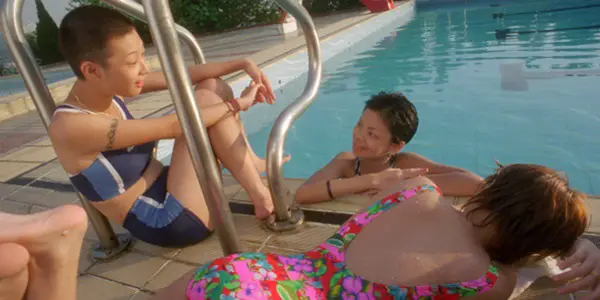
It’s no surprise that the cinema of late 1990s and early 2000s Hong Kong—right after the 1997 handover of Hong Kong, in which 156 years of British colonial rule finally came to an end—portrays a people and a region in flux. Filmmakers channeled the uncertainty they felt about what this monumental event signified for their future into their work, crafting cinematic tales of confusion and anxiety that drew in audiences with their lively storytelling, raw performances, and colorful imagery. No films better symbolize the livewire energy of this era in Hong Kong filmmaking than those focused on the youth of the region—the people with simultaneously the most to gain and the most to lose in this strange new world.
Lawrence Lau’s Spacked Out (2000) is one such movie, chronicling the misadventures of four troubled, working-class schoolgirls as they experiment with sex and drugs, try to make some money by any means necessary, and seek out an abortionist. Now available in a new 2K restoration from Kani Releasing, it’s not as well known as Fruit Chan’s masterful and melancholy Made in Hong Kong (1997), but it deserves to be mentioned alongside it as one of the highlights of the period.
No More Dream
Lau’s film takes place in Tuen Mun in the New Territories and centers on thirteen-year-old Cookie (Debbie Tam Kit-Man), who suspects she may be pregnant. Unfortunately, her boyfriend has absconded to Mong Kok to sell bootleg videos, predominantly of the adult variety; in addition, her best friend has been sent to reform school, her mother has disappeared, and her father…well, he isn’t exactly the supportive type. Fortunately, she has a trio of close pals who are ready and willing to help: Banana (Angela Au Man-Sze), who spends most of her time talking on party lines and hooking up with guys; Sissy (Christy Cheung Wing-Yin), who dreams of modeling for magazines; and Bean Curd (Maggie Poon Mei-Kei), who considers herself Sissy’s boyfriend and is willing to wage war against anyone who dares look at her girl.
source: Kani Releasing
Spacked Out follows this quartet over a few raucous, rambling days that culminate in them heading to Mong Tok so Sissy can take a modeling job and Cookie can track down her boyfriend. When neither of these things goes according to plan, Banana brings them to a female relative who is willing to lend them money for an abortion, but from there, more trouble ensues in the form of said relative’s gangland boyfriend and his associates. Still, there are few creatures in this world more resilient than a teenage girl, especially at that tender age where major events often seem minor and the minor unbelievably momentous in comparison.
Among the sea of coming-of-age films out there, Spacked Out is refreshing in its focus on rough-and-tumble working-class girls and all of the real issues they face; the film doesn’t judge them for their indiscretions, but treats them with empathy and understanding. In the eyes of the adults around them, Cookie and her crew are by no means “good girls”—they show up late for school, wear inappropriate clothes, help smuggle drugs, and pull box cutters on rival gangs in convenience stores—but they’re good friends, and that’s what matters. And given that most of them have parents that are either physically or emotionally absent (if not both), then it’s no surprise that they are so loyal to each other and so distrusting of the majority of the authority figures in their lives.
source: Kani Releasing
Spacked Out also doesn’t shy away from reminding us how young these girls really are, which only adds to the intensity of the situations they find themselves in. When Banana brings home a boy from the party line and begins hooking up with him in her bedroom, the camera follows their scrambling feet as they nearly kick over the various childhood toys that still clutter Banana’s room, stuffed animals watching them with glassy, unfeeling eyes. They may play-act at being adults, but these girls are merely hovering at the threshold, not truly ready to cross over.
Just a Girl
The colorful, chaotic world of Spacked Out is one that looks and feels so utterly of its time, from the layered, patterned camisoles that Sissy in particular loves to wear to the big chunky cell phone Banana uses to make party line calls in class. I was 12 years old in 2000, and while the world I grew up in was an ocean away from Tuen Mun, so much of what I saw onscreen in the film filled me with nostalgia. This includes the vibrant, candy-colored palette, which in addition to being visually appealing on its own, reminded me of the eye-catching colors used in teen magazine layouts at the turn of the twenty-first century.
The cast consists of predominantly nonprofessional actors, which makes Spacked Out feel all the more authentic in its portrayal of this awkward, messy time in the lives of teenage girls; even if the dialogue occasionally sounds stilted, it still feels real at its core, especially when expressing pain and desperation. Cookie occasionally muses on the events of the film via voiceover, addressing both her absent mother and her best friend, and there is a strong undercurrent of sadness that ripples through every word she utters.
source: Kani Releasing
This feeling is never more palpable than when Cookie accidentally befriends an older teen named Lai-Yee (Vanesia Chiu Man-Wah), who seems willing to take the wayward younger girl under her wing. In one of the film’s most devastating sequences, Cookie follows Lai-Yee to an interview for a program to study abroad in Japan; as she eavesdrops on Lai-Yee reciting her lengthy list of credentials and accomplishments, Cookie compares her own and comes up so woefully short that she cannot even imagine earning such an opportunity herself. Yet the desire to start new somewhere else is so strong that Cookie finds herself going to the library to read a book on Japan; when she is unable to check out the book herself, Lai-Yee does it for her.
Conclusion
Lai-Yee is a responsible girl with a bright future—in other words, everything that Cookie is not. And while Cookie holds some resentment over this, and contemplates never returning the book so that Lai-Yee will get in trouble, she finds herself writing down the due date in her diary regardless. It may only signify a subtle change in character, but it bodes well for Cookie’s future. There are no easy ways out of the gutter for the girls of Spacked Out, but there is hope, and that’s better than nothing.
Spacked Out is screening at Metrograph in New York and streaming on Metrograph At Home.
Does content like this matter to you?
Become a Member and support film journalism. Unlock access to all of Film Inquiry`s great articles. Join a community of like-minded readers who are passionate about cinema – get access to our private members Network, give back to independent filmmakers, and more.











